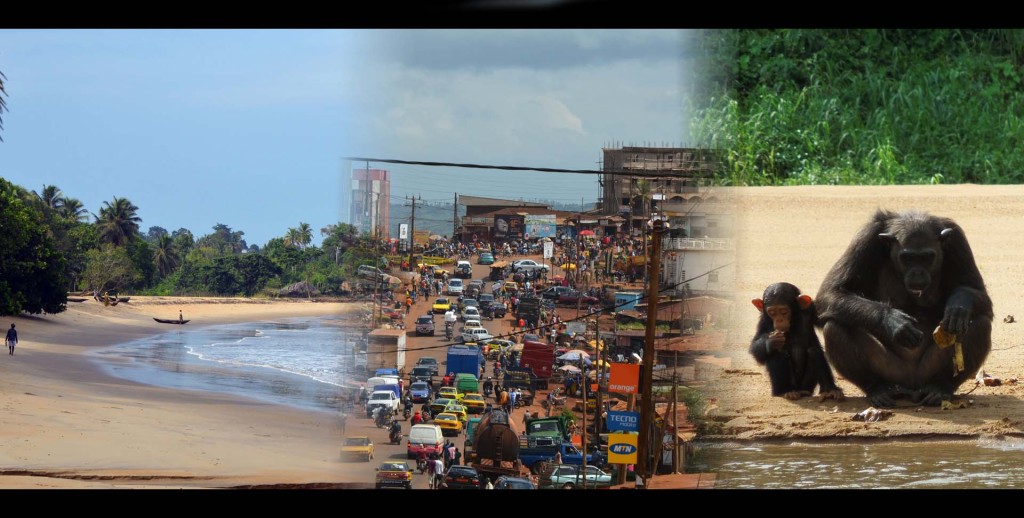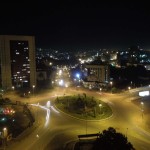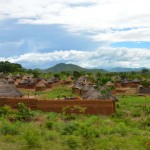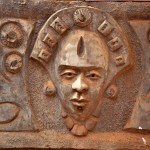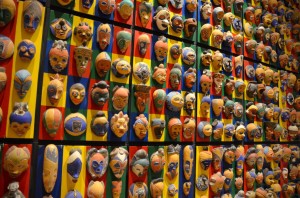When, how long and how many participants: 16 days, in May 2013. We were two.
Budget: Cheap.
Flight is the biggest deal ( return flight is 700€ from Brussels to Yaoundé), but you can lunch in the street for 1€, enjoy a huge pint of cold beer for 1€, and get out of a decent restaurant for 6-10€ including your drink.
A short trip in an overcrowded taxi cost 0,30€, and a 5 hours trip in a rusty, overcrowded and uncomfortable “coach” (Toyota HiAce, 20 passengers) cost about 6€.
Count between 15 and 30€ for a decent room for two in hotels.
To make it short : Cameroon is not a very touristy destination yet, although a growing part of the population and the government are understanding the possibilities for the slowly catching up-country. This is a great opportunity, as there is definitely plenty to see for less: Eat fruit directly harvested from the luxuriant tropical forests, go on a safari in Wasa or Boubandjida to observe the wide range of legendary African animals live in the wild, sip from a coconut on the paradise beaches of Kribi, or let the magical stories about the still adulated Lamido’s (powerful village leader) carry you away in the west.
Cameroonian are friendly, but often interested in your money. You must accept that spending enough to fly to Cameroon is already a proof they are right.
“Le blanc” (the white man), -as they will often call you (if you are white) without real note of racism- is not really present outside big towns, and you can expect kids and adults stop to stare at you, or try to get a “Bonjour” back, as you might be the first white they saw in months. Nevertheless, Cameroon is wild but peaceful, and safe enough when you stick to the basic traveler’s security rules (keep valuables in bags, bags close, do not wander around at night,…).
Highlights in my trip :
-Go on a safari in the north
-Visit the monkey sanctuary of Pongo island
-Rest on the Kribi beaches, eating the freshest prawns.
- Yaoundé by night
- Village around Ngaoundere
- Wall of the Chefferie, Bafoussam
Good to know:
Transports:
–Driving in Cameroon is insane, …or a least really different. I strongly advise to let locals drive (tour guide, bus and taxi drivers): Roads are in a critical state, haven’t been adapted to the massive traffic in towns, and you will unlikely have the time to get used to their driving rules.
–Every single vehicle you will see there is old, rusty and broken. They would just all fail at the technical inspection over here… but hey, this is Africa, and you have to move around.
-Travel in taxi is easy but far from what you expect of a taxi trip. First of all, a taxi driver accepts up to 6 clients at the same time (4 at the rear, 2 on the front seat + the driver, yes, that makes seven. Even in their Toyota Starlet!). They will horn towards you if a seat is available, and will slow down (not stop!): this gives you just enough time to yell your destination and the price you are willing to pay. Important note: Taxi drivers do not know the name of their streets. When you want to move in town, make sure you know the name of the suburbs and something well known, like the big pharmacy or a famous shop, restaurant, hotel… nearby. for example “Etoa-meki, magasin Select, 200”. If they agree with your proposition, they will horn again, to let you jump in. When you see that drivers keep refusing to take you in, it’s time to raise your proposition.
-Travel on coaches is really uncomfortable. The vehicle does not leave unless it’s full, and this is bad luck, as they turned the seats into wooden benches in order to stuff more passengers. You will not believe how many people they manage to squeeze in a van. Nevertheless, it’s often the only way to travel from town to town, if you want to pay a reasonable price.
-There are no metro, no tram, and in some towns the only taxis are moto-taxis. There is one (two) train line taking you once a day from the West to the Center, and another one from the Center to the North.
-Bargain and discuss for everything, even for your room. Flat rates hardly exist, except for coaches tickets, or some basic elements like fruits in the market.
Health and Safety:
-Always check embassy websites before going.
-On the disease side: Yellow fever vaccination is mandatory. Mosquitoes transmit malaria: different treatments are available to protect yourself. Rage is still present in Cameroon, avoid contact with dogs and bats. Depending on how long you stay, your doctor will give you adapted advice.
-Eat your food well cooked and stay away from watery veggies.
-Stick to bottled water (no tap!)
Mandatory papers and useful equipment:
-Passport, Visa for Cameroun and your vaccination certificate are required.
-It’s Africa: Sun lotion, hat and sunglasses advised…
-Protect yourself against mosquitoes and biting flies: bring the strongest repellent, wear long sleeves at sunset. Many hotels provide a mosquito net, but not all… therefore travel with your own bed net would be relevant.
Still under construction.

